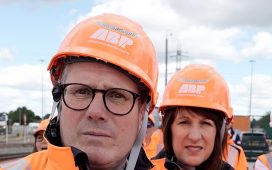The City is in the grip of an unfolding crisis.
Unilever’s choice last week of Amsterdam, rather than London, for the primary listing of its ice-creams business is the latest blow.
In 2020, when the consumer goods giant tried to domicile in the Netherlands, protests by big investors kyboshed its plans.
The climate has changed in the intervening years as companies such as Flutter, Tui and Ashtead either have switched their primary listing or declared that intention. A narrative has taken hold that London is no longer the place to be.
Investment trusts are seen as sitting ducks for corporate raiders and some businesses that do want to list here, such as China’s Shein, find their ethics and transparency under the microscope.
As the Mail on Sunday reported, influential City figures believe we need mergers to create national champions in industries such as oil, banking, insurance and pharma.

Shocking: Chancellor Rachel Reeves thinks the recipe for growth is to pour taxpayers’ money into the state sector
At the centre of this speculation is a possible deal between BP and Shell, whose boss Wael Sawan last year bemoaned that his shares are listed in ‘a location that clearly seems to be undervalued.’ Would a combined group keep its primary listing in the UK or move to the US – well, what do you think?
Frustration levels over valuations are understandably high.
Take ITV. Its boss, the impressive Carolyn McCall, has swung the group towards the Studios business – which produced hits such as Rivals – and the ITV X streaming service. Her pivot, however, has not been recognised in the share price and she is under pressure to look at deals to unlock value. To see a stalwart of Britain’s creative industries in this plight is depressing.
Blame can be laid in a number of places. Brexit, whether one supported it or not, was off-putting to international investors who saw the UK as a gateway to the EU.
Pension fund regulation has pushed UK schemes into buying gilts: they now invest only a tiny proportion of total assets in London-listed equities. US tech shares have been delivering better returns.
Greedy bosses who think they will make more for themselves outside the UK are in the frame, along with the advisers who pander to them.
The Government is making matters even worse. Labour’s weird decision to scale back on promised support for a vaccine facility in Liverpool prompted drugs company AstraZeneca to scrap plans to build it there.
The failure to back one of our biggest companies in a key industry will only encourage Astra to continue shifting its centre of gravity towards the US and away from the UK.
There are no plans to move its primary listing as yet, but how long will that last?
Ministers are also, unaccountably, dithering over awarding Rolls-Royce contracts for Small Modular Reactors (SMRs) that would help meet the UK’s nuclear power needs and green energy targets as well as creating jobs.
Rachel Reeves thinks the recipe for growth is to pour taxpayers’ money into the state sector where productivity, as my colleague Hamish McRae has pointed out, is shocking.
This philosophy is off-putting to international investors who know that healthy, vibrant private sector businesses and stock markets are required for that.
All may not be lost. Labour could make intelligent choices to support sectors such as life science, nuclear and the creative industries. It could encourage pension funds to invest in UK equities and it could scrap Stamp Duty on share trading.
It would be a start.
DIY INVESTING PLATFORMS

AJ Bell

AJ Bell
Easy investing and ready-made portfolios

Hargreaves Lansdown

Hargreaves Lansdown
Free fund dealing and investment ideas

interactive investor

interactive investor
Flat-fee investing from £4.99 per month

Saxo

Saxo
Get £200 back in trading fees

Trading 212

Trading 212
Free dealing and no account fee
Affiliate links: If you take out a product This is Money may earn a commission. These deals are chosen by our editorial team, as we think they are worth highlighting. This does not affect our editorial independence.









